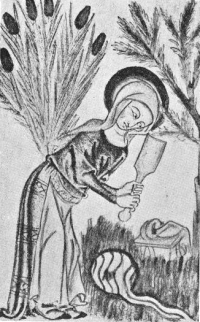I thought this week I’d amuse you with some medieval insults. Some were used for good-natured ribbing, whereas others might be more defamatory in nature. Reputation was important in the medieval world, and slandering the wrong person meant you could find yourself in court. Men typically based their reputations on social status, whereas the reputations of women were more based on their virtue and the way they conducted themselves. Depending on where you live, some of these insults (or versions of them) might still be in use today. If this is the case, please know that no real offense is intended—this is all in good fun!
Bespawler: Someone who spits when they talk.
Bobolyne: A fool.
Churl: Coarse and peasant-like. Its origin is the Old English “ceorl” which meant “one level above a slave.”
Cox-comb: A vain, narcissistic person.
Cumberworld: A useless person.
Dalcop: A very stupid person.
Doxy: A promiscuous woman. Also literally the wife or lover of an outlaw who robbed people on the road.
Driggle-Draggle: A messy or untidy woman.
Fopdoodle: A stupid, idiotic person.
Fustilugs: A large, clumsy slob.
Glos Pautonnier: An Old French word for a gluttonous scoundrel.
Hedge-born: Of base birth, or illegitimate
Levereter: Corrupt (“Liver-eater”)
Mandrake Mymmerkin: Childlike. A puppet, or little man.
Muck-sprout: Someone who is overly talkative and curses a lot.
Mumblecrust: A toothless beggar.
Puterelle: A woman of ill-repute.
Raggabrash: A grubby, disorganized person.
Rakefire: A guest who has outstayed their welcome.
Ronyon: An old, mangy, scabby woman
Saddle-goose: A very stupid person.
Scobberlotcher: A lazy person who never works hard.
Skamelar: A scrounge, or parasite.
Snoutband: Someone who constantly interrupts a conversation to correct or contradict the speaker.
Sot: A drunkard.
Stampcrab: A clumsy person.
Trencherman: Someone who overeats and attends social events just for the food.
Wandought: A weak, ineffectual man.
Whiffle-whaffle: An indecisive person who wastes others’ time.
Yaldson: The son of a prostitute.
Use the Medieval Monday Index to discover more topics relating to daily life in the Middle Ages.
 Those dirty clothes really pile up, don’t they? Especially when you have kids. As much as I grumble about having to wash and fold, I’m not really doing the work—the washing machine is taking care of the hard part for me. Our medieval counterparts certainly didn’t have that luxury, or many others that we don’t give much thought to. So in honor of my growing laundry pile, I thought today’s post would answer the question of “how would I have done it back then.”
Those dirty clothes really pile up, don’t they? Especially when you have kids. As much as I grumble about having to wash and fold, I’m not really doing the work—the washing machine is taking care of the hard part for me. Our medieval counterparts certainly didn’t have that luxury, or many others that we don’t give much thought to. So in honor of my growing laundry pile, I thought today’s post would answer the question of “how would I have done it back then.” If one needed to remove stains, this could be done with the use of Fuller’s Earth or ashes soaked in lye. The mixture would be applied to the stain, allowed to try, then rubbed off. For more delicate materials, such as silk, verjuice was another remedy. Removing stains such as oil or grease was a more complex process. One recipe is as follows: “To remove grease or oil stains, take urine and heat until warm. Soak the stain for two days. Without twisting the fabric, squeeze the afflicted area, then rinse. As an alternative for stubborn greasy or oily stains, soak in urine with ox gall beaten into it, for two days and squeeze without twisting before rinsing.” White cloth could be cleaned and brightened by soaking it in lye, which was mixed using ashes and urine.
If one needed to remove stains, this could be done with the use of Fuller’s Earth or ashes soaked in lye. The mixture would be applied to the stain, allowed to try, then rubbed off. For more delicate materials, such as silk, verjuice was another remedy. Removing stains such as oil or grease was a more complex process. One recipe is as follows: “To remove grease or oil stains, take urine and heat until warm. Soak the stain for two days. Without twisting the fabric, squeeze the afflicted area, then rinse. As an alternative for stubborn greasy or oily stains, soak in urine with ox gall beaten into it, for two days and squeeze without twisting before rinsing.” White cloth could be cleaned and brightened by soaking it in lye, which was mixed using ashes and urine.